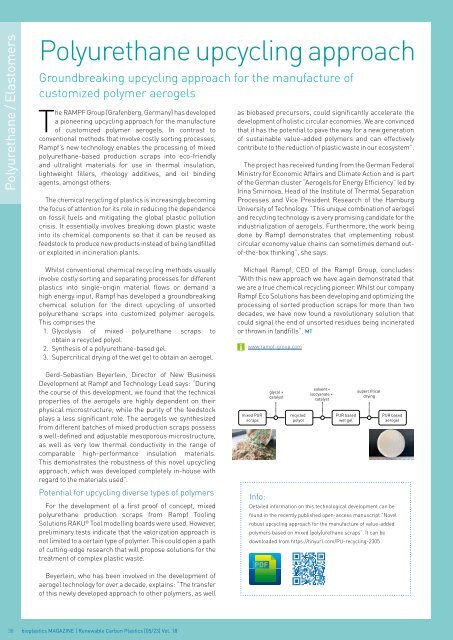Issue 05/2023
Highlights Fibres / Textiles Polyurethane / Elastomers
Highlights
Fibres / Textiles
Polyurethane / Elastomers
You also want an ePaper? Increase the reach of your titles
YUMPU automatically turns print PDFs into web optimized ePapers that Google loves.
Polyurethane / Elastomers<br />
Polyurethane upcycling approach<br />
Groundbreaking upcycling approach for the manufacture of<br />
customized polymer aerogels<br />
The RAMPF Group (Grafenberg, Germany) has developed<br />
a pioneering upcycling approach for the manufacture<br />
of customized polymer aerogels. In contrast to<br />
conventional methods that involve costly sorting processes,<br />
Rampf’s new technology enables the processing of mixed<br />
polyurethane-based production scraps into eco-friendly<br />
and ultralight materials for use in thermal insulation,<br />
lightweight fillers, rheology additives, and oil binding<br />
agents, amongst others.<br />
The chemical recycling of plastics is increasingly becoming<br />
the focus of attention for its role in reducing the dependence<br />
on fossil fuels and mitigating the global plastic pollution<br />
crisis. It essentially involves breaking down plastic waste<br />
into its chemical components so that it can be reused as<br />
feedstock to produce new products instead of being landfilled<br />
or exploited in incineration plants.<br />
as biobased precursors, could significantly accelerate the<br />
development of holistic circular economies. We are convinced<br />
that it has the potential to pave the way for a new generation<br />
of sustainable value-added polymers and can effectively<br />
contribute to the reduction of plastic waste in our ecosystem”.<br />
The project has received funding from the German Federal<br />
Ministry for Economic Affairs and Climate Action and is part<br />
of the German cluster “Aerogels for Energy Efficiency” led by<br />
Irina Smirnova, Head of the Institute of Thermal Separation<br />
Processes and Vice President Research of the Hamburg<br />
University of Technology. “This unique combination of aerogel<br />
and recycling technology is a very promising candidate for the<br />
industrialization of aerogels. Furthermore, the work being<br />
done by Rampf demonstrates that implementing robust<br />
circular economy value chains can sometimes demand outof-the-box<br />
thinking”, she says.<br />
Whilst conventional chemical recycling methods usually<br />
involve costly sorting and separating processes for different<br />
plastics into single-origin material flows or demand a<br />
high energy input, Rampf has developed a groundbreaking<br />
chemical solution for the direct upcycling of unsorted<br />
polyurethane scraps into customized polymer aerogels.<br />
This comprises the<br />
1. Glycolysis of mixed polyurethane scraps to<br />
obtain a recycled polyol.<br />
2. Synthesis of a polyurethane-based gel.<br />
3. Supercritical drying of the wet gel to obtain an aerogel.<br />
Gerd-Sebastian Beyerlein, Director of New Business<br />
Development at Rampf and Technology Lead says: “During<br />
the course of this development, we found that the technical<br />
properties of the aerogels are highly dependent on their<br />
physical microstructure, while the purity of the feedstock<br />
plays a less significant role. The aerogels we synthesized<br />
from different batches of mixed production scraps possess<br />
a well-defined and adjustable mesoporous microstructure,<br />
as well as very low thermal conductivity in the range of<br />
comparable high-performance insulation materials.<br />
This demonstrates the robustness of this novel upcycling<br />
approach, which was developed completely in-house with<br />
regard to the materials used”.<br />
Potential for upcycling diverse types of polymers<br />
For the development of a first proof of concept, mixed<br />
polyurethane production scraps from Rampf Tooling<br />
Solutions RAKU ® Tool modelling boards were used. However,<br />
preliminary tests indicate that the valorization approach is<br />
not limited to a certain type of polymer. This could open a path<br />
of cutting-edge research that will propose solutions for the<br />
treatment of complex plastic waste.<br />
Michael Rampf, CEO of the Rampf Group, concludes:<br />
“With this new approach we have again demonstrated that<br />
we are a true chemical recycling pioneer. Whilst our company<br />
Rampf Eco Solutions has been developing and optimizing the<br />
processing of sorted production scraps for more than two<br />
decades, we have now found a revolutionary solution that<br />
could signal the end of unsorted residues being incinerated<br />
or thrown in landfills”. MT<br />
www.rampf-group.com<br />
mixed PUR<br />
scraps<br />
Info:<br />
glycol +<br />
catalyst<br />
recycled<br />
polyol<br />
solvent +<br />
isocyanate +<br />
catalyst<br />
PUR based<br />
wet gel<br />
supercritical<br />
drying<br />
PUR based<br />
aerogel<br />
Detailed information on this technological development can be<br />
found in the recently published open-access manuscript “Novel<br />
robust upcycling approach for the manufacture of value-added<br />
polymers based on mixed (poly)urethane scraps”. It can be<br />
downloaded from https://tinyurl.com/PU-recycling-23<strong>05</strong><br />
Beyerlein, who has been involved in the development of<br />
aerogel technology for over a decade, explains: “The transfer<br />
of this newly developed approach to other polymers, as well<br />
38 bioplastics MAGAZINE | Renewable Carbon Plastics [<strong>05</strong>/23] Vol. 18

















